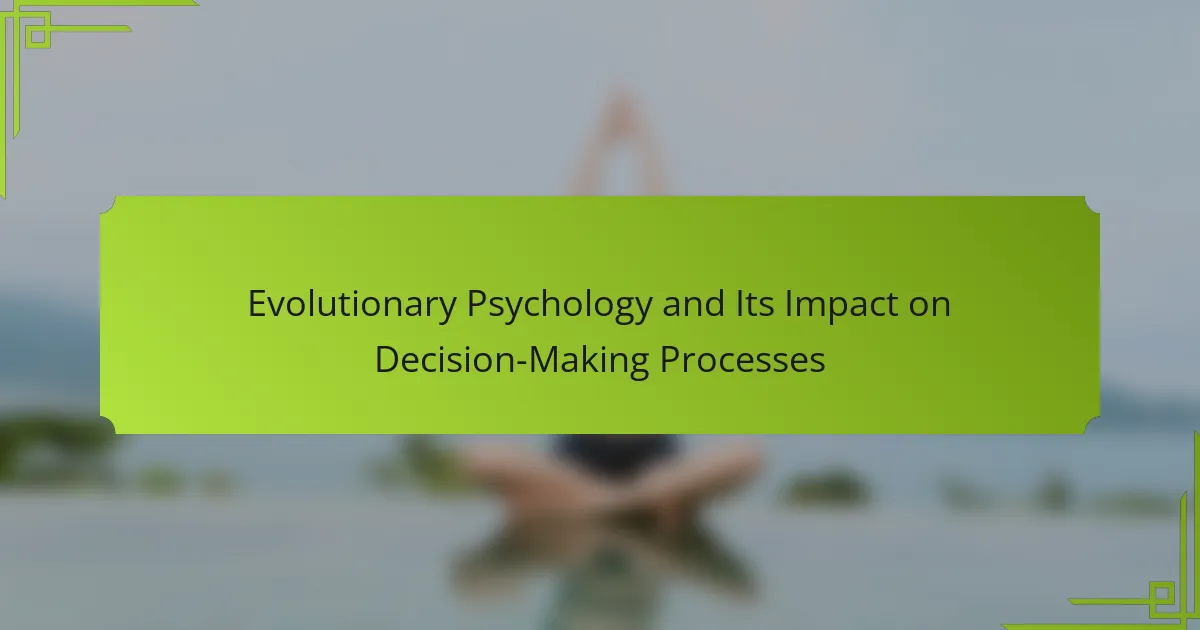Understanding how evolutionary psychology influences decision-making can enhance your ability to navigate choices effectively. This article explores the innate psychological mechanisms shaped by natural selection, the universal attributes affecting behaviour, and the impact of cognitive biases on modern decisions. It also examines how social dynamics and structured frameworks can improve decision quality in various contexts. Finally, the article highlights the importance of continuous learning and adaptation in refining decision-making strategies.

What is the foundation of evolutionary psychology in decision-making?
Evolutionary psychology suggests that decision-making is influenced by innate psychological mechanisms shaped by natural selection. These mechanisms evolved to solve problems faced by our ancestors, impacting modern human behaviour. For instance, risk assessment abilities stem from survival instincts. This foundation highlights that many choices are driven by evolved traits rather than rational thought alone. Understanding these influences can enhance decision-making strategies in various contexts.
How does evolutionary psychology explain human behaviour?
Evolutionary psychology explains human behaviour as a product of adaptive processes shaped by natural selection. This perspective highlights how ancestral environments influenced decision-making mechanisms that enhance survival and reproduction.
Key attributes of evolutionary psychology include the role of innate drives, such as the need for social connection and resource acquisition. These drives guide choices in modern contexts, influencing behaviours related to mate selection and cooperation.
Research indicates that cognitive biases, which evolved to simplify decision-making, often lead to suboptimal choices in contemporary settings. For instance, the availability heuristic can skew risk assessment, reflecting adaptations to ancestral environments where immediate dangers were prevalent.
Understanding these evolutionary underpinnings provides insight into behavioural patterns, revealing that many decisions stem from deep-rooted instincts rather than rational calculations. This perspective encourages a nuanced view of human behaviour, emphasizing the interplay between biology and environment.
What role does natural selection play in decision-making processes?
Natural selection significantly influences decision-making processes by shaping innate preferences and behaviours. It drives individuals to make choices that enhance survival and reproductive success. For instance, risk aversion may stem from evolutionary pressures favouring cautious behaviour in uncertain environments. This adaptive trait encourages decisions that prioritise safety and resource conservation. As a result, understanding these evolutionary roots can provide insight into contemporary human behaviour and decision-making strategies.
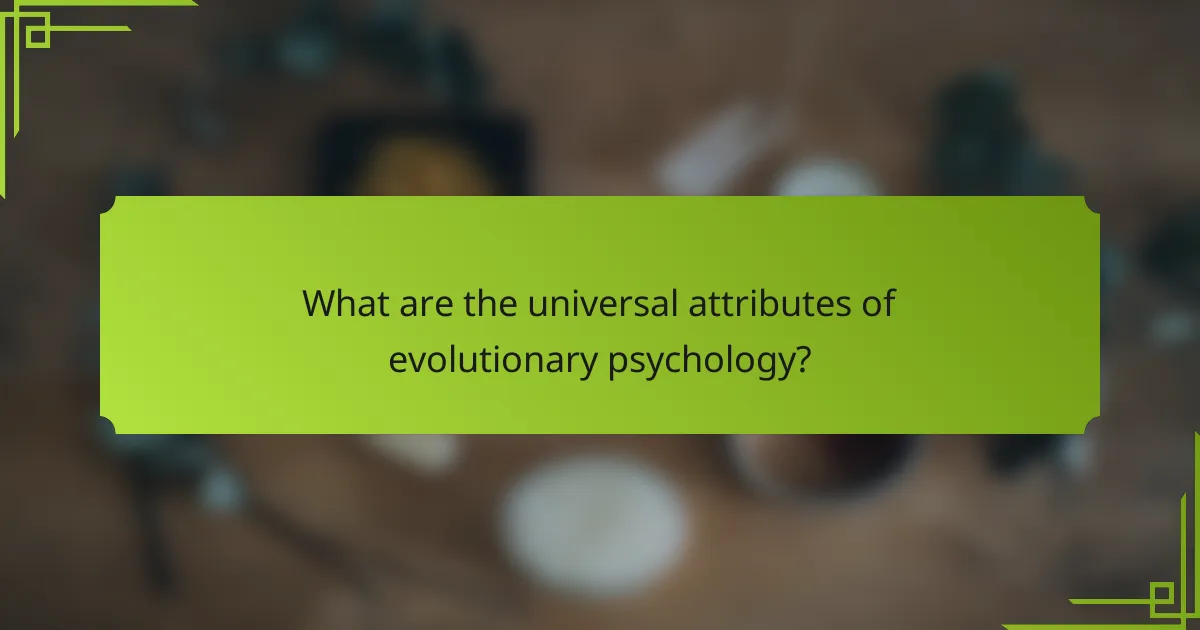
What are the universal attributes of evolutionary psychology?
Evolutionary psychology is characterised by universal attributes that influence human behaviour and decision-making. These attributes include the adaptive nature of behaviours, the role of ancestral environments in shaping psychological traits, and the emphasis on survival and reproduction as key motivators.
These attributes highlight how evolutionary pressures have moulded cognitive processes, emotional responses, and social interactions. For example, decision-making often prioritises immediate rewards reflecting ancestral survival strategies.
Additionally, evolutionary psychology examines universal emotional expressions, suggesting that certain feelings and reactions are biologically ingrained across cultures. This perspective aids in understanding the underlying mechanisms of human behaviour, making it a valuable framework for analysing decision-making processes.
How do cognitive biases influence our decisions?
Cognitive biases significantly shape our decision-making processes by distorting perception and judgement. These biases arise from evolutionary adaptations, influencing choices in ways that often favour immediate rewards over long-term benefits. For instance, the availability heuristic leads individuals to rely on immediate examples that come to mind, affecting risk assessment. Confirmation bias causes people to favour information that supports existing beliefs, hindering objective analysis. Understanding these biases can improve decision-making by promoting awareness of their effects.
What is the significance of heuristics in decision-making?
Heuristics play a crucial role in decision-making by simplifying complex choices. They allow individuals to make quick judgements based on previous experiences and cognitive shortcuts. This efficiency is vital in evolutionary psychology, where quick decisions could mean survival. Heuristics can lead to biases, but they often enable faster responses in uncertain situations. Understanding these mental shortcuts helps in recognising their impact on human behaviour and decision-making processes.
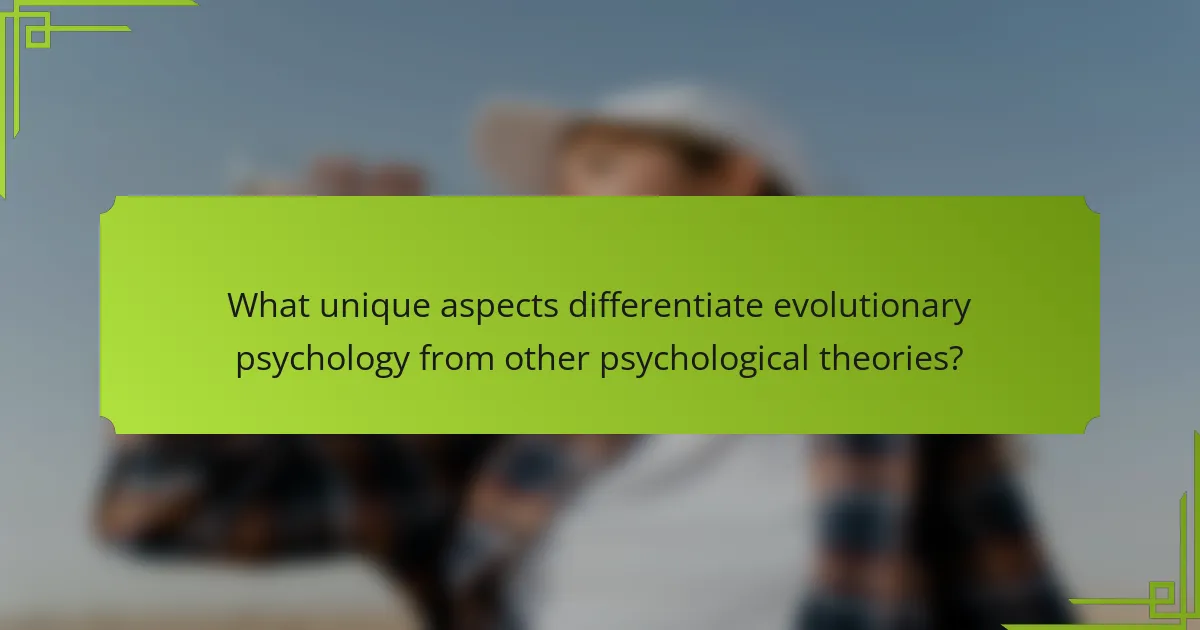
What unique aspects differentiate evolutionary psychology from other psychological theories?
Evolutionary psychology is distinct from other psychological theories due to its focus on how human behaviour is shaped by evolutionary processes. It emphasises innate psychological mechanisms that evolved to solve adaptive problems. Unlike cognitive or behavioural theories, which centre on learned behaviours or mental processes, evolutionary psychology integrates biological perspectives. This unique approach considers how evolutionary pressures influence decision-making processes, such as mate selection and resource allocation. As a result, it provides insights into behaviours that may seem irrational from a modern standpoint but were advantageous in ancestral environments.
How does evolutionary psychology address social behaviour in decision-making?
Evolutionary psychology explains social behaviour in decision-making by highlighting innate psychological mechanisms shaped by natural selection. These mechanisms influence how individuals assess risks and rewards in social contexts. For example, humans often prioritise cooperative behaviour, which fosters group cohesion and enhances survival. This evolutionary perspective reveals that social dynamics, such as trust and competition, are deeply rooted in our biological heritage. Understanding these influences can lead to more effective strategies in various fields, including marketing and conflict resolution.
What are the implications of evolutionary psychology for understanding risk-taking?
Evolutionary psychology suggests that risk-taking behaviours are adaptive traits shaped by natural selection. These behaviours can enhance survival and reproductive success by allowing individuals to explore new opportunities or environments. For example, taking risks can lead to resource acquisition or mating opportunities, crucial in ancestral environments. Understanding these implications can help explain modern decision-making processes, where individuals weigh potential rewards against perceived risks.
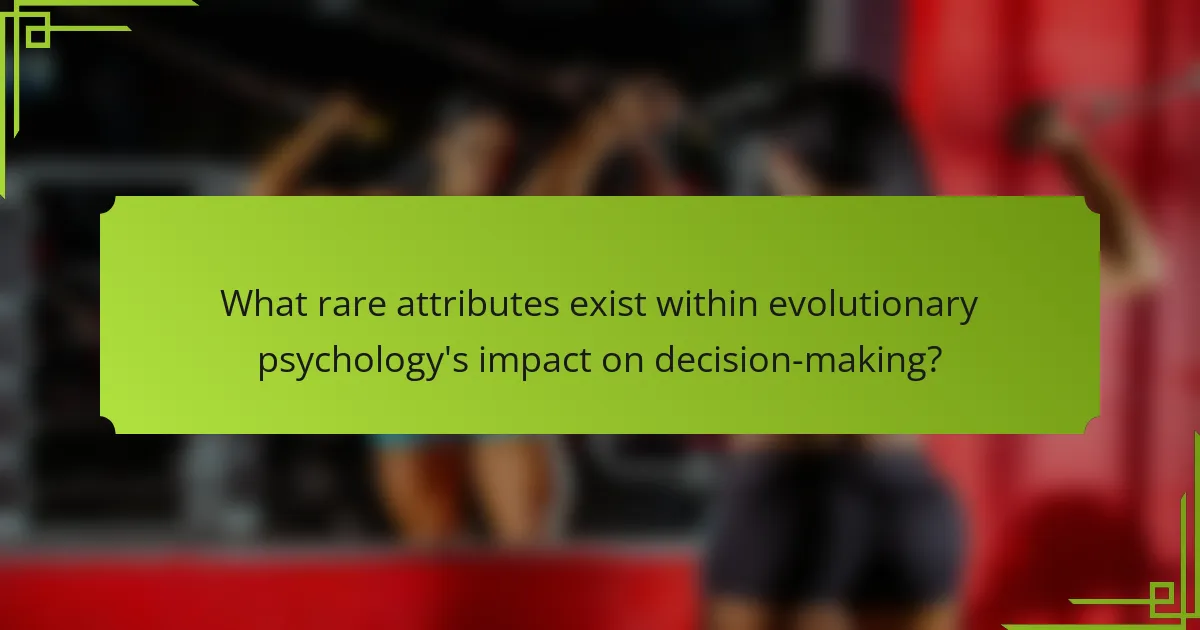
What rare attributes exist within evolutionary psychology’s impact on decision-making?
Evolutionary psychology influences decision-making through rare attributes such as adaptive reasoning, which enhances survival strategies. Another rare trait is the impact of ancestral environments on modern choices, shaping preferences for risk and reward. Additionally, cognitive biases rooted in evolutionary history can distort judgement, leading to decisions that favour immediate benefits over long-term gains. These attributes illustrate how evolutionary processes uniquely inform contemporary decision-making behaviours.
How do specific cultural contexts shape decision-making processes?
Cultural contexts significantly influence decision-making processes by shaping individuals’ values, beliefs, and social norms. These factors guide choices and behaviours in various situations. For instance, collectivist cultures prioritise group harmony, affecting decisions related to family and community. In contrast, individualistic cultures emphasise personal autonomy, leading to decisions focused on self-interest. Additionally, cultural attitudes towards risk can alter decision-making styles; cultures with high uncertainty avoidance may prefer structured approaches. Understanding these dynamics can enhance cross-cultural communication and improve collaborative outcomes.
What are the less common evolutionary influences on consumer behaviour?
Less common evolutionary influences on consumer behaviour include social signalling, resource competition, and mate selection. These factors shape preferences and decisions beyond basic survival needs. Social signalling affects brand choices, as individuals often select products that convey status or identity. Resource competition drives consumers to seek products that enhance perceived value or scarcity. Mate selection influences decisions through preferences for traits associated with desirability, such as quality and reliability in products. Understanding these influences provides insight into complex consumer motivations.
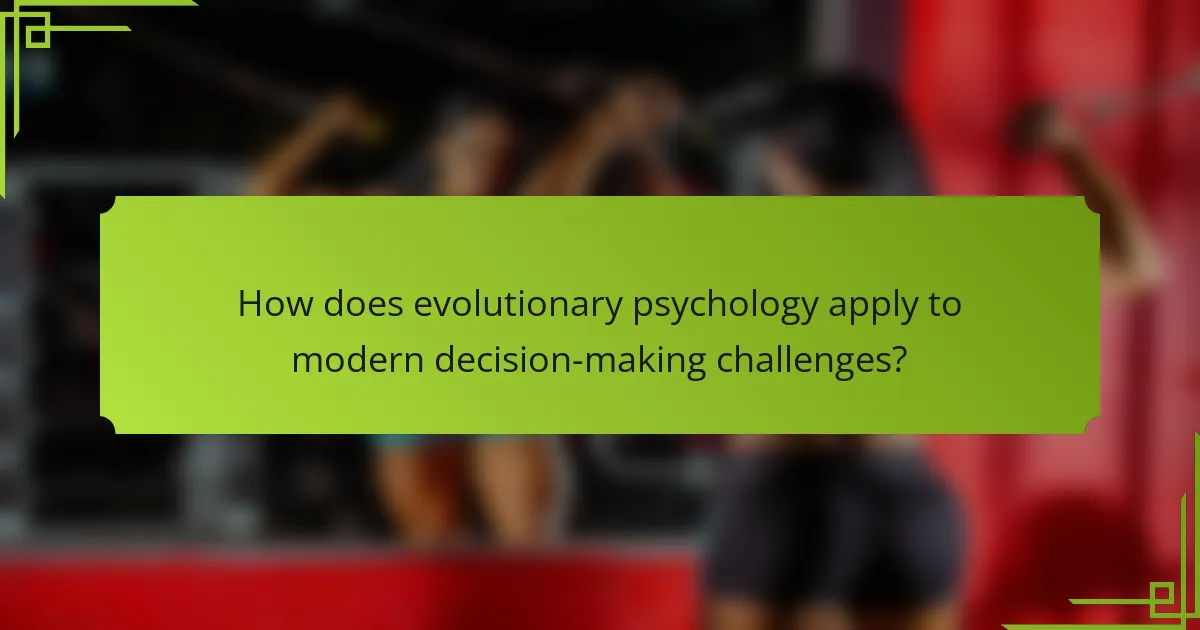
How does evolutionary psychology apply to modern decision-making challenges?
Evolutionary psychology significantly influences modern decision-making challenges by providing insights into human behaviour. It suggests that many decision-making processes stem from adaptive traits developed over time. For instance, cognitive biases, which often lead to irrational choices, can be traced back to survival mechanisms.
Understanding these biases enables individuals and organisations to improve decision-making strategies. By recognising patterns in behaviour, one can anticipate potential pitfalls. Moreover, evolutionary psychology emphasises the role of social dynamics in decision-making. Groupthink, for example, arises from our ancestral need for social cohesion, impacting modern group decisions.
Incorporating evolutionary insights can lead to more effective problem-solving methods, enhancing decision quality in various contexts, from business to personal life. This approach ultimately fosters better outcomes by aligning strategies with innate human tendencies.
What lessons can be drawn from evolutionary psychology for business strategies?
Evolutionary psychology offers insights into consumer behaviour that can enhance business strategies. Understanding innate human motivations allows companies to tailor their marketing and product development effectively.
For instance, businesses can leverage the concept of social proof, which stems from our evolutionary need for belonging. By showcasing customer testimonials and user-generated content, companies can foster trust and encourage purchases.
Moreover, recognising the importance of scarcity can drive demand. Limited-time offers tap into the human instinct to prioritise rare opportunities, prompting quicker decision-making.
Lastly, applying the principles of reciprocity can enhance customer loyalty. When businesses provide value upfront, such as free trials or informative content, they activate a psychological trigger that encourages customers to reciprocate through purchases or brand loyalty.
How can understanding evolutionary psychology improve personal decision-making?
Understanding evolutionary psychology enhances personal decision-making by revealing innate biases and motivations. This insight allows individuals to recognise patterns in their behaviour, leading to more informed choices. For example, acknowledging the influence of survival instincts can help mitigate impulsive decisions driven by fear or scarcity. By applying evolutionary principles, people can align their choices with long-term goals rather than short-term gratification. This approach fosters greater self-awareness and improves overall decision quality.
What are common misconceptions about evolutionary psychology in decision-making?
Common misconceptions about evolutionary psychology in decision-making include the belief that it solely focuses on biological determinism. Many assume that human behaviour is fixed and unchangeable, ignoring the role of culture and environment. Another misconception is that evolutionary psychology justifies negative behaviours as natural, rather than understanding them as adaptations that can evolve. Additionally, some people think that evolutionary psychology lacks empirical support, while numerous studies validate its principles. Lastly, there is a tendency to oversimplify complex behaviours as purely evolutionary, neglecting the interplay of cognitive processes and social influences.

What best practices can enhance decision-making through evolutionary psychology?
Utilising best practices from evolutionary psychology can significantly enhance decision-making processes. Understanding inherent biases and cognitive frameworks helps individuals and organisations make more informed choices.
First, recognise the influence of evolutionary biases such as loss aversion, which can lead to overly cautious decision-making. By being aware of these biases, decision-makers can counteract them, leading to more balanced assessments.
Second, leverage the concept of social proof, where individuals look to others for cues on appropriate behaviour. This can guide better decisions, especially in group settings, by fostering a collaborative environment that encourages diverse perspectives.
Third, implement a structured decision-making framework that incorporates evolutionary insights. Techniques like scenario planning can help anticipate potential outcomes and align decisions with long-term goals, enhancing overall effectiveness.
Lastly, continuous learning and adaptation are vital. Encouraging reflection on past decisions and their outcomes can refine future choices, embedding a culture of improvement that aligns with evolutionary principles.
How can individuals leverage evolutionary insights for better choices?
Individuals can leverage evolutionary insights to make better choices by understanding innate biases and decision-making processes. Recognising these evolutionary traits helps in identifying emotional responses and cognitive shortcuts that influence choices. For example, awareness of the tendency to favour immediate rewards over long-term benefits can lead to more thoughtful decision-making. Additionally, using knowledge of social dynamics, such as conformity and competition, can improve interpersonal interactions and collaborative efforts. By applying these insights, individuals can enhance their self-awareness and refine their decision-making strategies for personal and professional growth.
What strategies can organisations implement based on evolutionary psychology?
Organisations can implement strategies based on evolutionary psychology to enhance decision-making. These strategies include understanding innate human behaviours, leveraging social proof, and creating environments that align with natural instincts. For example, promoting collaboration taps into the evolutionary need for social interaction. Additionally, framing choices in a way that highlights potential losses can motivate more decisive actions. By applying these insights, organisations can improve employee engagement and optimise outcomes.
